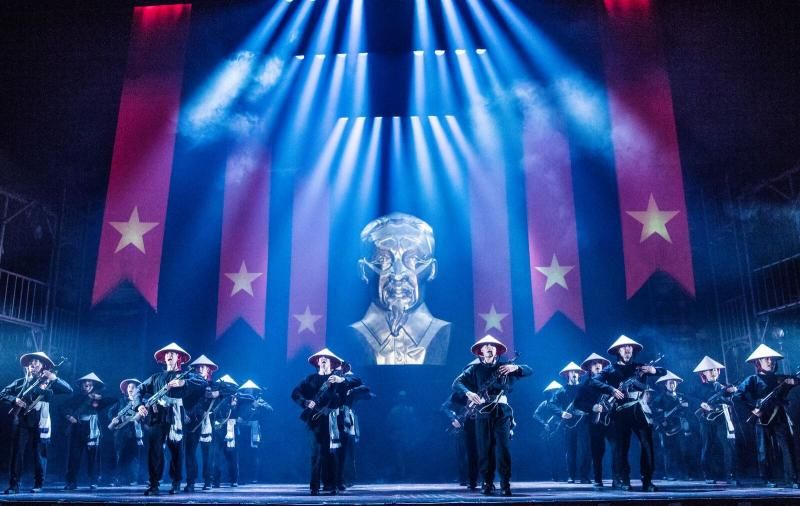Review: The Horrific Beauty of MISS SAIGON Returns to Nashville's Tennessee Performing Arts Center

in the revival of Miss Saigon. - photos by Matthew Murphy
Compellingly dramatic and featuring an exquisitely emphatic score performed by a dazzling cadre of triple-threat actors and a 15-person orchestra, Miss Saigon once again lands at Nashville's Tennessee Performing Arts Center's Andrew Jackson Hall this week for an eight-performance run that will almost certainly stand out among the very best of productions to play Music City during the tenure of departing CEO Kathleen O'Brien. With heart-stopping performances by its trio of stars - Red Concepcion as The Engineer, Emily Bautista as Kim and Anthony Festa as Chris are superb - who are ably supported by a huge company of equally impressive performers, Miss Saigon is at once one of musical theater's most stunning examples, while remaining an enigma among audiences yet to experience its power in person.
 More than a quarter century since the Claude-Michel Schonberg and Alian Boublil musical drama first played Nashville in its first national tour, Miss Saigon continues to pack an emotional wallop. Its heart-rending story of a beautiful but naïve young Vietnamese woman (Bautista) falling in love with a feckless and conflicted young American soldier (Festa) in the waning days of the Vietnam War and the fall of Saigon to communist troops from the North, provides the ideal conduit for considering the cataclysmic impact of recent history on the current state of international affairs.
More than a quarter century since the Claude-Michel Schonberg and Alian Boublil musical drama first played Nashville in its first national tour, Miss Saigon continues to pack an emotional wallop. Its heart-rending story of a beautiful but naïve young Vietnamese woman (Bautista) falling in love with a feckless and conflicted young American soldier (Festa) in the waning days of the Vietnam War and the fall of Saigon to communist troops from the North, provides the ideal conduit for considering the cataclysmic impact of recent history on the current state of international affairs.
The story related in Miss Saigon is over-arching in its scope insofar as historical context is concerned, yet it manages (perhaps surprisingly) to be both authentic and deeply personal. How audiences respond to the story of Kim and Chris - and all those around them in the fictionalized world of southeast Asia in the not-so-distant past - may vary, but the play's momentous final scene (which is among musical theater's most electrifying) cannot help but move them, regardless of any pre-conceived notions or prejudices.
Like Schonberg and Bloublil's better known Les Miserables, the score for Miss Saigon is sumptuous and stirring, with multiple instances in which you are reminded of the similarities of the two scores. Yet for Miss Saigon, Schonberg has composed music which has a far more contemporary flair - like its inspiration (Puccini's Madama Butterfly, another tale of an Asian beauty who falls hard for a dashing American military man) it sounds timeless and romantic - which sets it apart from much of the contemporary musical theater canon. Because Miss Saigon is almost completely sung-through, as is its operatic inspiration, audiences on opening night at TPAC this week seemed initially reluctant to embrace the show's thoroughly involving yet totally captivating and complex storyline. Nonetheless, I suspect they remain haunted by the show's horrific beauty long past the show's final curtain has rung down on the Jackson Hall stage.
Bruno Poet's atmospheric and evocative lighting design casts a giant shadow across the production's visual aesthetic, in both a literal and figurative sense, shedding light on Mick Potter's beautifully conceived scenic design that instantly whisks audiences away to Saigon in 1975 and Bangkok in 1978. The production's visual design adds to the story's dramatic and historic overtones, providing strong storytelling elements on their collective own to give Boublil's libretto (which features English translations by Richard Maltby and additional lyrics by Michael Mahler) a strong technical foundation upon which to build. Likewise, Luke Halls' extraordinary projections effectively portray a time and place that became known to Americans during daily reports from the region during the evening news shows of the late 1960s and early 1970s.

The structure of Miss Saigon, which follows a non-linear timeline that is easily interpreted with skill and creativity, instantly draws audiences into the story from the very first moments. Presented without an overture, the action of the play begins immediately as we're transported to Saigon, circa 1975, to find American GIs and Vietnamese locals engaged in a hyper-sexualized world on the brink of destruction. So effortlessly does Miss Saigon draw you into its story that you might at first be put off by its frank and honest sensibilities - but you quickly find yourself totally immersed and engaged.
The story of Kim, who has seen her entire family and the provincial village in which they lived destroyed in the firestorm of battle, is poignant and horrifying to be certain, yet it is beautiful and effective in all its grotesque realities. When the beautiful and newly minted bargirl meets Chris, a handsome American marine, struggling to make sense of war and his role therein, they quickly are caught up in a romance destined to end in tragedy, but which plays out over the course of several years in the aftermath of the fall of Saigon (which is depicted in amazing detail late in Act Two, when a helicopter descends from the flyspace above the Jackson Hall stage in a moment of theatrical wizardry that continues to impress more than 25 years since it was first seen) with staggering impact.
Bautista's performance as Kim clearly provides the emotional lynchpin for the sweeping tale of Miss Saigon and her commitment to the role is nothing short of stunning. Her glorious voice ensures every note is sung with deep conviction and expressive meaning, and her onstage chemistry with Festa as her lover is portrayed with palpable intensity. Festa's own rich tones provide the perfect match for Bautista's and their duets are achingly romantic and heartfelt (particularly Act One's "Sun and Moon" and "The Last Night of the World"), while Festa's solo on "Why God Why?" is searing and startling. Bautista's performance of the Act One finale - "I'd Give My Life for You," sung to three-year-old Tam (played on opening night by Fin Moulding), the son borne of her brief affair with Chris - is awe-inspiring in its dramatic impact.

Bautista's Kim is passionate and maternal, by turns, and her final sacrifice is both terrifying and beautiful at the same moment, while Festa's conflicted Chris telegraphs his character's emotional turmoil throughout his performance.
Concepcion is by turns ingratiating and repellent as The Engineer, the pseudo master of ceremonies/concierge who guides audience throughout the complex and involving tale of Miss Saigon. Resolutely smarmy and oily (not unlike a carnival pitchman), Concepcion's Engineer is ingratiating and obsequious when he needs to be - and threatening and conniving all the time. The actors deftly captures his character's multi-dimensional attributes in a performance that culminates in the exquisite decadence of "The American Dream" in which he humps the hood of a Cadillac with the enthusiasm of a pimp grown tired of his stable of prostitutes.
As Chris' comrade-in-arms John, J. Daughtry gives a strong performance in which he refuses to deliver the expected. Rather, his John accurately reflects the dual nature of the soldier in wartime and the citizen in peacetime in order to challenge and upend political and societal norms. Stacie Bono is well-cast as Chris' American wife Ellen, who must come to terms with the realities of her husband's wartime relationship in a convincing manner.
 As the action of Miss Saigon plays out onstage, each scene seems to move effortlessly and gracefully into another with ease and precision. Credit to director Laurence Connor for his strong direction of this revival and to choreographer Bob Avian for his musical staging that creates the world with such a vivid impact. Music director Will Curry conducts the 15-member orchestra with dexterity and vigor, with his musicians performing the score with an intensity and passion that ensures a most memorable night of theater.
As the action of Miss Saigon plays out onstage, each scene seems to move effortlessly and gracefully into another with ease and precision. Credit to director Laurence Connor for his strong direction of this revival and to choreographer Bob Avian for his musical staging that creates the world with such a vivid impact. Music director Will Curry conducts the 15-member orchestra with dexterity and vigor, with his musicians performing the score with an intensity and passion that ensures a most memorable night of theater.
Miss Saigon. Music by Claude-Michel Schonberg. Lyrics by Richard Maltby Jr. and Alain Boublil. Adapted from the Original French text by Alain Boublil. Additional lyrics by Michael Mahler. Directed by Laurence Connor. Musical staging and choreography by Bob Avian. Presented by Broadway at TPAC. Through Sunday, June 9. For details, go to www.TPAC.org or call (615) 782-4040. Running time: 2 hours, 50 minutes (with one 20-minute intermission).
Reader Reviews
Powered by
|
Videos

